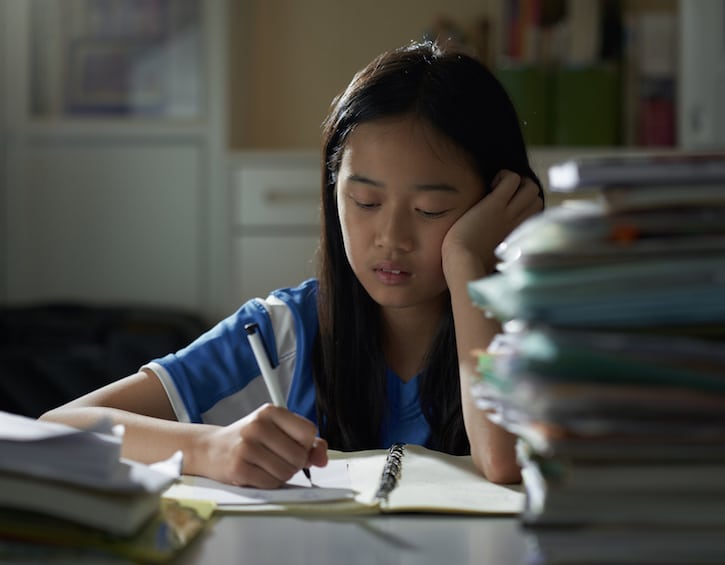
 Post Category - ParentingParenting - Post Category - Older KidsOlder Kids
Post Category - ParentingParenting - Post Category - Older KidsOlder KidsP6 students start the PSLE on 15 August, and PSLE results will come out in mid-November. A primary school mama wonders whether she’s choosing the right path – and shares advice from mamas who’ve survived the PSLE
So, we’re in PSLE (Primary School Leaving Examination) season. Not that my kids are taking the PSLE exams – one is in primary five, the other is in primary three – it’s just that I’m reminded of this every time I look at my Facebook feeds where there are photos and status updates from my mummy and daddy friends quipping or lamenting about the exams. I read these with empathy, some amusement, and an uncomfortable dose of guilt.
My sense of disquiet stems from how awfully unprepared I feel for the all-important primary six year. For starters, nine out of ten people I know who has a child in primary school send their kid for enrichment lessons in at least one school subject. The tuitions my kids are enrolled in? Nada.
And this thing called Direct School Admission (DSA) in primary six, I’m utterly clueless as to how it works and I’m probably too late in the game as well. Don’t parents prepare their kid since primary one by sending them for competitive swimming training or intensive piano or violin lessons? My kids love to swim, but their idea of swimming is splashing around in the water, not swimming lap after lap like mini Schoolings. Piano lessons? We gave up after too many daily practises ended up in tears for both my kids and me.
Read more: Sassy Mama meets the ‘Tiger Mum’ Amy Chua

I had signed up my eldest child for Math and English tuition when she was in primary one, but we stopped in primary two, mainly because her schoolwork and tests always came back stellar. I could have attributed this to a great tuition program but deep down I knew she was an attentive child in school and could handle her schoolwork well. Most importantly, she truly seemed bored with tuition. So, I took a leap of faith and let it all go.
That said, I’m not an entirely hands-free, zen mum either. I do coach my kids. My form of English tuition is badgering them to read; Chinese tuition is conversing with them in Mandarin and teaching them the use of Chinese idioms; while Math tuition is assigning them a couple of pages of work in assessment books once a week. I review the schoolwork they bring home and as long as I can see they are still keeping a good standard of work in school, I leave them be.

In comparison to my friends whose kids can burn through tonnes of assessment books and past year papers within a year, I do realise I’m doing just the bare minimum. And that’s where the guilt sets in.
I feel guilty for not being a tiger mum. Seeing those around me who are, I often wonder if I should be. I wonder if I’m failing my kids, if I’m doing my best for them and if I’m encouraging them to reach their potential.
I’m not saying that my kids are smart so they don’t need tuition. There are after all plenty of smart kids out there taking tuition because they and their parents know how competitive it can be getting into top secondary schools. Trust me, the peer pressure has tempted me too many times to jump on the bandwagon.
I don’t know if I’m too laid back a mum for their good but I know I’m giving my kids time to enjoy their childhood. When not completing homework or revising for tests or exams, my kids spend their time reading, free playing, drawing and doing arts and crafts. I know I don’t need my child to top the school or qualify for the Integrated Programmes at secondary school. Maybe I’m just fine with them being average academically because that’s was what I was through all my schooling years.

I was never saddled with tuitions when I was in primary school. My parents did engage a Math and English tutor for me when I was in upper primary, which in hindsight, feels like a waste of time. I don’t remember feeling inspired or having benefited from the tuitions. But I do remember having a fantastic childhood with plenty of time to read, play and watch TV. I got a pretty average PSLE score but qualified for the secondary school of my choice, graduated from university ,and had a fulfilling career in financial journalism. For someone with a rather average PSLE score, I think I did alright so far in life.
I might start panicking and regretting my laid-back ways when my kids are in upper primary, or when the Math problem sums and Science questions prove too difficult for me to help them with. If we survive this without caving in to tuitions till the dreaded PSLE, I’ll trust that they’ll be able to wing it, just like their mum did.

Advice from other Mamas on preparing for primary six and PSLE
“In primary three and four, children should learn to clarify and seek help from teachers or parents if they are unsure of the syllabus taught in school. By primary five, if there is anything they are still unsure of, parents will need to help them get up to speed. By the time they move to primary six, it will be more about doing revision for PSLE. If given a choice, I’d rather not enrol my kids for tuition, it’s a lot of work running here and there, and it’s a lot of money spent as well. But if your child is not self-motivated, having tuition does help to keep them afloat. I think ultimately we shouldn’t stress our kids too much, it’s more important that they are happy and healthy, and sleeping and eating well before the exams. ” – K. Tan, mother of two, one in primary five and one in secondary four
“When in primary one and two, it’s about instilling good habits and self-discipline in your child, like making sure that they are disciplined enough to do their homework and learn their spellings. Primary four is a huge leap from primary three, especially for Math and Science. Parents need to monitor their child’s progress and if he/she is weak in certain subjects, parents need to figure out why and plug in the gaps as soon as possible. It’s all about building a strong foundation before they go on to primary six. If their foundation is strong, there is less need for tuitions. Children respond differently to tuitions. We found that tuitions were not as effective for our son as compared to our own coaching, as we spend time finding his weak points, whereas tutors at tuition centres may not be able to do so. Coaching on our own is time consuming — as we have to study the school curriculum, set specific practise questions and review them with him. In the June holidays before PSLE, our son would spend five hours a day on revision and practise papers.” – Vivian Li, mother to one in secondary three

“Many parents who want to take the DSA route in primary six tend to groom their kids from primary one onwards in activities like ballet, piano and competitive sports. It’s also about figuring out what talent your child has. If he/she is good in Math or arts, then perhaps signing up for Math Olympiad or art classes, and nurturing his/her gift could help him/her during DSA applications. But even if your child has already secured a DSA offer, it doesn’t mean he/she can slack for the PSLE. It’s still important to maintain a certain standard in your PSLE score. It does not reflect well on your child if he/she can enter a school via DSA yet does poorly in the PSLE.” – Angela Lim, mum to one in secondary three
“Moving up from primary four to five is a jump and I believe it will be a leap from primary five to six. Having a strong foundation is important. It’s useless giving them advanced material if their foundation is weak. But if a child has a strong foundation, it would be apt to start preparing for PSLE in primary five just because there really isn’t much time in primary six as they will take the exams in September. Exposing them to PSLE papers and getting them to practise past year papers is important. The oral component is one of the hardest to ace. On my part, I will go through past year papers with them and encourage to come up with their own opinion.” – KL Wong, mother of two, one in primary four and one in primary six
Read more:
Do Primary School grades matter? A Singaporean mama weighs in on the MOE’s new guidelines
Is Tuition really necessary? A teacher on the pros and cons
The Best Tuition Centres in Singapore






 View All
View All




 View All
View All









 View All
View All



